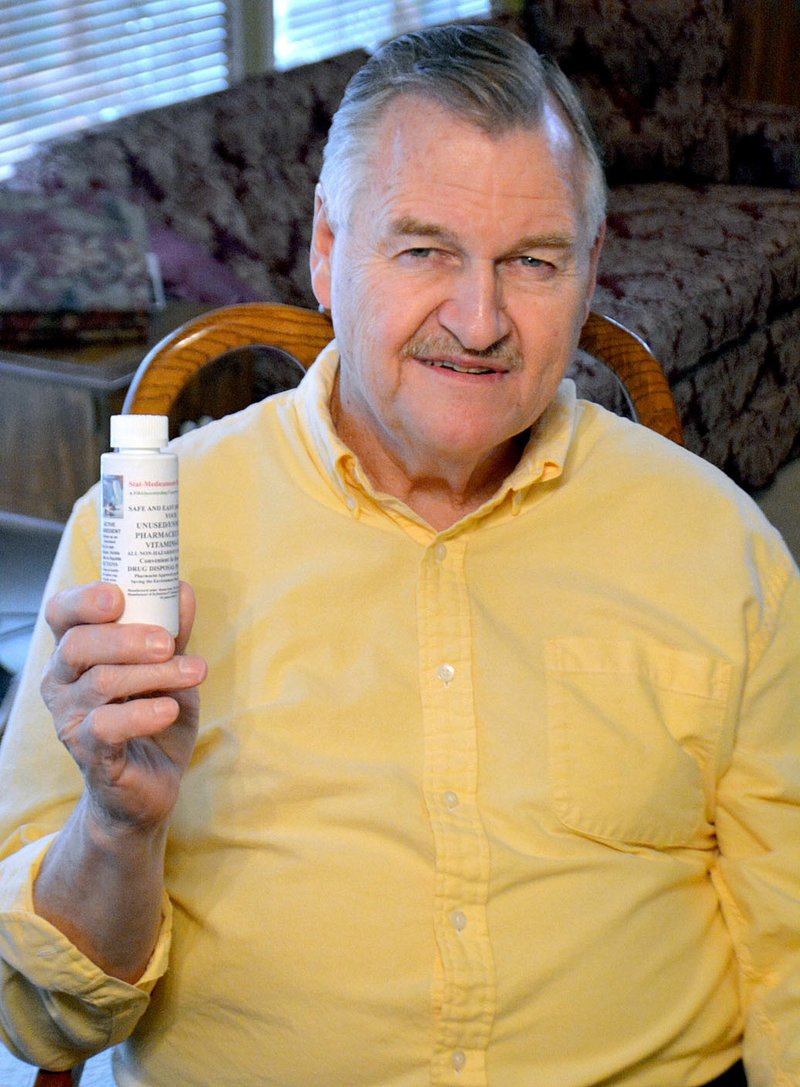A young Siloam Springs-based company that created an innovative way to safely dispose of pharmaceuticals was recently chosen as a winner of the 2017 American Small Business Championship.
Stat-Medicament-Disposal Corporation, creator of an in-home pharmaceutical disposal bottle and recycling system, is one of two businesses in Arkansas and 102 from across the country that won the award. The championship is hosted by the Service Corps of Retired Executives (SCORE) and sponsored by Sam's Club.
All of the American Small Business Championship winners will receive a $1,000 Sam's Club gift card, an all expenses paid trip to a training and networking event, and SCORE mentoring and publicity throughout the year. Three finalists will be announced this summer and will receive a $25,000 grand prize and a trip to Washington D.C.
Businesses earned the championship title because of the unique aspects, their positive impact on the community and their plans to use the prize money to grow their businesses, according to a press release from SCORE.
Larry Kenemore Jr., inventor and Stat-Medicament-Disposal Corporation CEO, said that after 10 years of research in the recycling industry he learned that drinking water is polluted with pharmaceuticals, over the counter medications and vitamins. The problem is caused by disposing of these substances by flushing them down the drain or throwing them in the trash, where the chemicals then leach into ground water. Trace amounts of these chemicals are in almost every water supply in the country, and scientific evidence shows that even mild exposure can lower children's IQ and increase the incidence of other brain development problems, Kenemore said.
Kenemore was surprised to learn there are no Federal regulations banning or limiting these chemicals in drinking water because there is no known process that can remove these substances. Once they are in the water supply the are there forever, so the only solution is to prevent them from getting in the water supply in the first place, he said.
The chemicals in the water supply are a big problem for pharmaceutical companies since court rulings have ordered them to find a solution, Kenemore said. Most solutions are focused on creating drug take-back programs. However, Kenemore learned that only 7 percent of the population utilizes local drug take-back programs because most people want convenience and don't want to hold on to these items, then find a place to drop them off, he said.
Kenemore invented an in-home disposal bottle filled with a substance that neutralizes pharmaceuticals. Customers simply drop their pills or liquid medicine into the bottle and shake to neutralize. The exact ingredients of the neutralizing liquid are patented and a trade secret, but Kenemore said it includes activated charcoal.
Once the bottles have been filled, they can be returned to the Stat-Medicament-Disposal Corporation, which has contracted with another company that can burn the bottles for electricity, thus earning carbon credits. The carbon credits will be shared between the customer and Kenemore's company.
The disposal bottle is designed to be part of a larger recycling program, also invented by Kenemore. He created a reusable recycling box with compartments for each type of item to be recycled. Each compartment is labeled and has the correct sized hole for the recyclable item to fit in. Customers would fill the box each week and set it on the curb to be picked up by the recycling company then cleaned and returned.
Sorting is a major problem for the current recycling business model, Kenemore explained. Items are either sorted by the customer or sorted by machines in the recycling plant. Both methods limit the type of items that can be recycled. Customers are often confused about whether their items are recyclable or not, so they opt to just toss them in the trash, Kenemore explained. Sorting machines can't accept items such as plastic bags or glass because they clog up the machines.
Kenemore's system would presort the recyclable items, making it possible for a recycling center to accept a much wider variety of items. He worked with the company's five-member board of directors to design a recycling center disassembley line for the recycling boxes that could accommodate staff members with disabilities. He has also designed a system for collecting food waste for compost.
The social enterprise company's business model is based on contracting with cities to provide medical disposal and recycling services. The company recently reached an agreement with Danville, a city of about 1,600 homes, to pilot the medical bottle disposal system. The company has plans to test the water at three months, six months and nine months to show the difference the disposal system can create.
Stat-Medicament-Disposal Corporation has a five member board and is minority and woman owned by majority stockholders Kevin Walker and Kim Dobson Walker. The company is working with SCORE mentor Greg Gimlin and Arkansas Small Business Technology Center in Russellville to bring the products to smaller cities across the country, Kenemore said.
More information about Stat-Medicament-Disposal Corporation, as well as Kenemore's blog about recycling issues, is available at statmeddisposal.net.
General News on 03/29/2017
